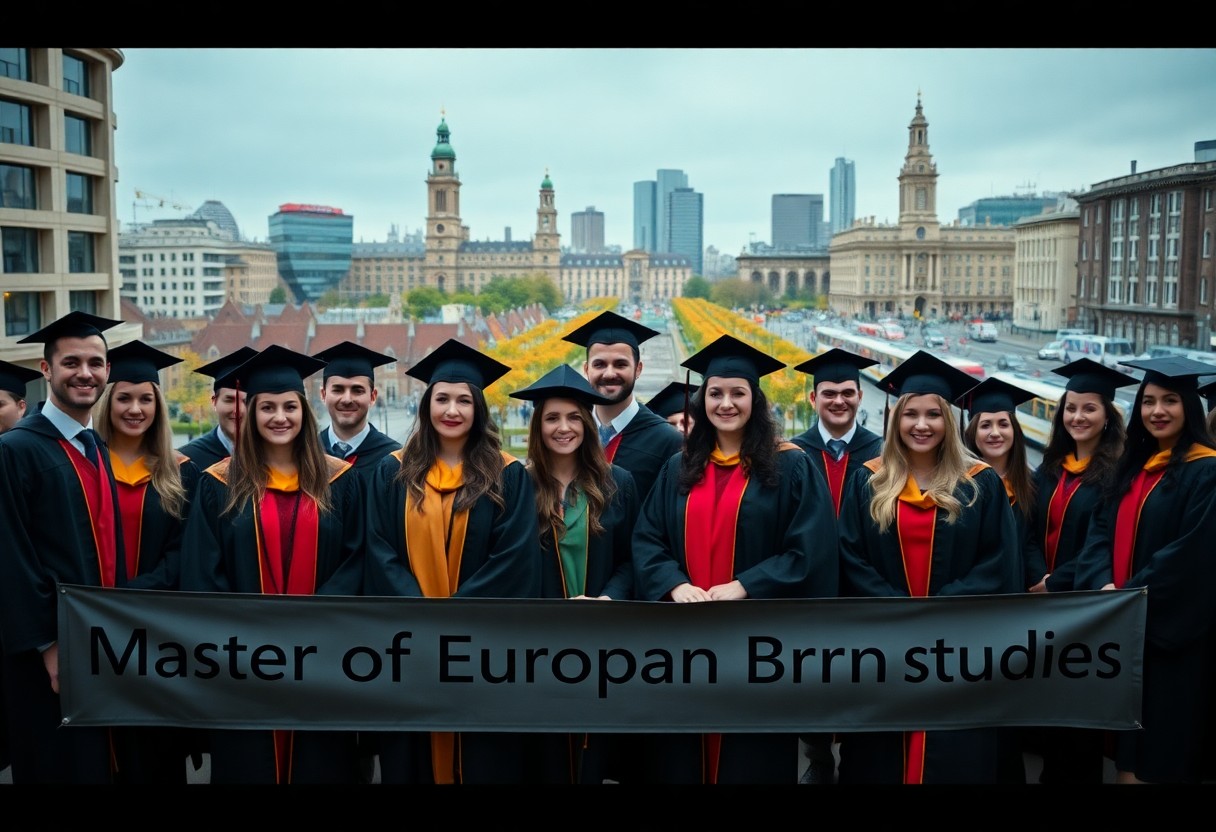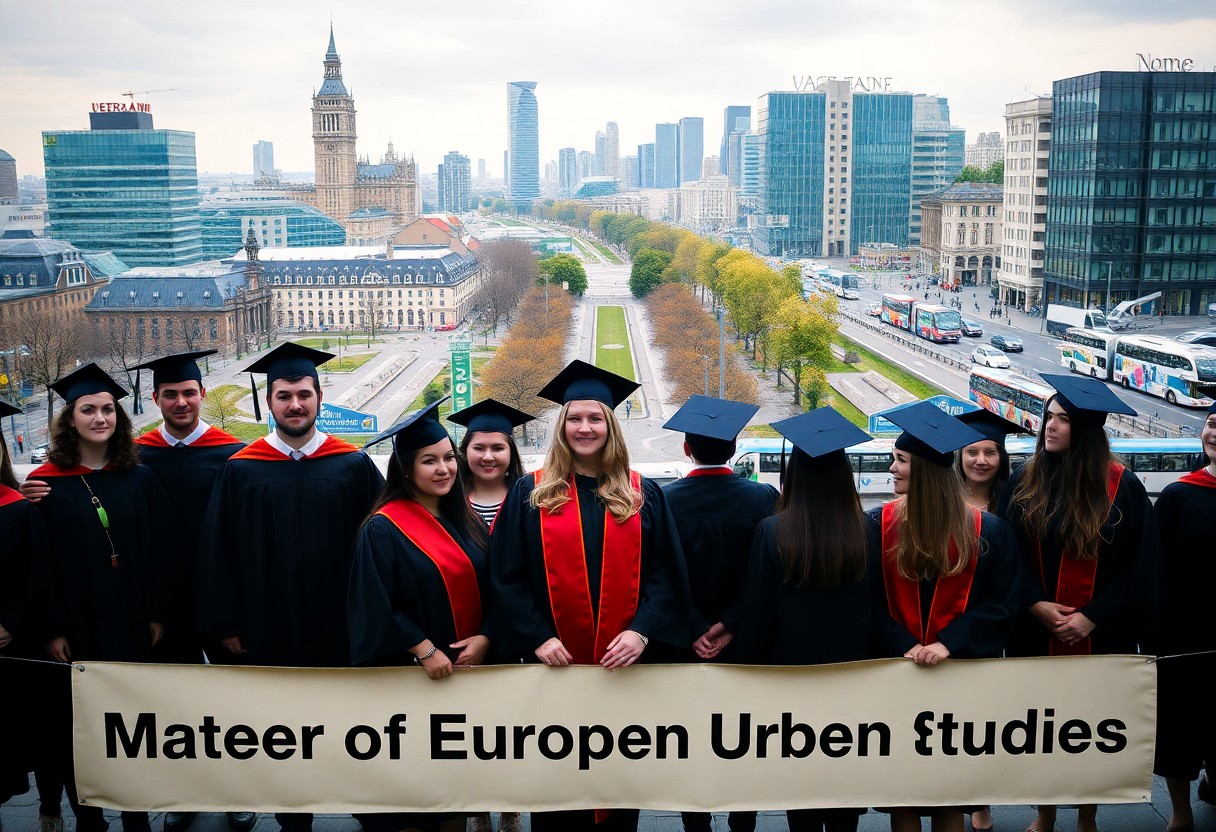There’s a unique opportunity for you to enhance your understanding of the complexities of urban development through the Master of European Urban Studies (MEUS). This program equips you with multidisciplinary skills to tackle pressing urban challenges across Europe. By integrating perspectives from sociology, geography, and planning, you will gain valuable insights into the diverse social, economic, and political dimensions shaping urban life. As cities evolve, this Master’s program prepares you to contribute effectively to sustainable urban futures, making it an excellent choice for aspiring urban professionals.
Key Takeaways:
- MEUS provides a comprehensive understanding of the complex socio-economic, cultural, and environmental challenges facing European cities today.
- The program emphasizes interdisciplinary approaches, drawing from fields such as urban planning, sociology, geography, and policy studies to equip students with diverse analytical skills.
- Students benefit from a multicultural learning environment, with opportunities for networking and collaboration through partnerships with various European institutions and local communities.
The Interdisciplinary Nature of MEUS
The MEUS program emphasizes a holistic approach to urban studies, drawing from various disciplines to enrich your comprehension of urban environments. This interdisciplinary framework enables you to analyze urban issues from multiple perspectives, integrating elements of history, economics, geography, and technology. By connecting these diverse fields, you cultivate a well-rounded understanding that equips you to tackle complex challenges and contribute effectively to urban development initiatives across Europe.
Integrating Urban Planning, Sociology, and Policy
Your studies in MEUS encompass the interplay between urban planning, sociology, and policy-making. By engaging with these interconnected domains, you explore how social dynamics influence urban design, demographic trends, and governance. Practical case studies, such as the redevelopment of former industrial areas in cities like Rotterdam, showcase how sociological insights shape policies that promote inclusivity and sustainability, thus enhancing urban resilience.
The Role of Cultural Studies in Urban Development
Cultural studies serve as a vital component of understanding the vibrancy and diversity of urban spaces. Examining how cultural identities, practices, and narratives shape cities allows you to appreciate the complexities of urban experiences. A focus on cultural heritage and artistic expression can influence urban policies, fostering environments that promote community engagement and cultural tourism.
Cultural studies provide keys to deciphering the intricate layers of urban life. For instance, neighborhoods like Berlin’s Kreuzberg reflect rich cultural histories and immigrant influences, which play a significant role in the area’s identity and attractiveness. By integrating cultural considerations into urban planning, you can advocate for policies that celebrate diversity, promote artistic community development, and ensure access to public spaces that support cultural initiatives. Such efforts ultimately lead to more vibrant and cohesive urban environments, allowing residents to thrive and engage creatively.

Transformative Urban Challenges: A Curriculum Perspective
Exploring transformative urban challenges equips you with the knowledge to tackle pressing issues facing cities today. The MEUS curriculum emphasizes critical examination of how urban environments adapt to changing conditions. This section examines specialized challenges, highlighting the need for innovative thinking and multidisciplinary approaches in urban studies. By engaging with real-world case studies and historical trends, you gain insights into the ever-evolving landscape of European urbanization, preparing you to contribute to sustainable solutions in your future career.
Climate Change and Sustainable Urban Design
Addressing climate change demands innovative sustainable urban design strategies. You investigate into green architecture, urban green spaces, and low-carbon technologies, assessing their impact on urban resilience. By collaborating on projects that integrate environmental sustainability, you learn to create adaptable urban spaces that respond effectively to climate risks, ensuring the long-term viability of cities across Europe.
Social Inequality and Community Resilience
Social inequality profoundly impacts urban life, shaping access to resources, services, and opportunities. You will explore how marginalized communities face disproportionate challenges, yet possess resilient strategies for survival. By studying case studies from various European cities, you’ll uncover the dynamics of socioeconomic disparities and learn crucial approaches to foster equality and justice in urban settings.
Understanding social inequality and fostering community resilience is vital in addressing urban fragmentation. Through the MEUS program, you examine the interplay between socioeconomic factors and urban policies that perpetuate inequities. Engaging with community organizations, you discover innovative solutions that empower local populations, such as participatory budgeting and cooperative housing models. Case studies illustrate how cities like Barcelona and Berlin have invested in inclusive social frameworks, enabling communities to overcome barriers and thrive despite systemic challenges. This comprehensive approach prepares you to advocate for policies that prioritize equity and sustainability in urban environments.
MEUS in Action: Global Case Studies
Your journey through the Master of European Urban Studies (MEUS) allows you to engage with compelling global case studies that showcase innovative urban practices and policies. By examining these examples, you gain practical insights into how diverse cities navigate challenges like sustainability, social equity, and urban resilience. These experiences enhance your understanding of global urban dynamics while equipping you with actionable knowledge to implement in your future endeavors.
- Barcelona, Spain: Implementation of superblocks led to a 50% reduction in traffic and improved air quality by 10%.
- Copenhagen, Denmark: A target to be carbon-neutral by 2025 resulted in a 60% reduction in CO2 emissions since 2005.
- Amsterdam, Netherlands: The cycling infrastructure led to 38% of trips being made by bike, significantly reducing dependence on cars.
- Portland, USA: The integration of green buildings has reduced energy use by 28% in new constructions since 2010.
- Medellín, Colombia: The urban cable car system increased public transport accessibility, reducing poverty rates in serviced areas by 15%.
Urban Innovations in European Cities
European cities are at the forefront of urban innovation, with pioneering strategies reshaping their landscapes. Cities like Oslo are leading the charge in electric mobility, aiming for 100% emission-free transport by 2024, while Lisbon’s participatory budgeting allows citizens to allocate funds directly to community projects, fostering civic engagement and transparency in governance.
Lessons from International Urban Policies
International urban policies provide invaluable lessons that inform your approach to city planning and governance. By analyzing these experiences, you can adapt successful strategies to your context. For instance, Singapore’s focus on vertical gardening tackles land scarcity and enhances urban biodiversity, a model that can inspire similar initiatives across Europe. Likewise, New York City’s ‘One NYC’ initiative demonstrates how comprehensive planning integrates social, economic, and environmental goals, ensuring a sustainable urban future.
Exploring lessons from international urban policies reveals diverse models that effectively address urban challenges. Singapore’s successful implementation of smart city concepts, such as integrated transport systems and efficient waste management, highlights the potential of technology in urban planning. Similarly, Barcelona’s citizen-driven urban regeneration efforts underline the importance of community participation in achieving socially inclusive outcomes. These examples not only enhance your theoretical understanding but also empower you to craft innovative solutions reflecting the unique characteristics of your future urban landscapes.

Career Pathways: What Can Graduates Expect?
Graduates of the MEUS program can look forward to diverse career pathways, including roles in urban planning, policy analysis, sustainable development, and community engagement. Your education equips you with a multifaceted understanding of how cities function and adapt, allowing you to tackle real-world urban issues. Whether working with government agencies, consulting firms, or NGOs, your skills will be sought after as cities evolve to meet the needs of their populations.
Opportunities in Public, Private, and Non-Profit Sectors
The MEUS program opens doors to opportunities across public, private, and non-profit sectors. In local and regional governments, you could engage in urban policy-making or infrastructure projects. Private sector roles often pertain to real estate development and environmental consultancy, while non-profit organizations may focus on community outreach or sustainable urban initiatives. Each sector values your ability to analyze urban dynamics and propose viable solutions tailored to specific contexts.
Developing Skills for a Competitive Job Market
Equipping yourself with relevant skills can significantly increase your employability in today’s competitive job market. Courses in data analysis, geographic information systems (GIS), and project management enhance your technical proficiency. Simultaneously, soft skills like collaboration and communication are crucial for fostering partnerships with stakeholders. Engaging in internships, workshops, and networking events helps you gain practical knowledge and build a professional network, setting you apart from other candidates. Looking for practical experience through projects or volunteering can also provide you with the hands-on expertise that employers value.
To further cultivate your professional edge, consider participating in interdisciplinary projects and collaborating with fellow students from various backgrounds. This exposure will not only deepen your urban studies knowledge but also enhance your ability to approach challenges from diverse perspectives. Engaging with real-world case studies during your studies will ensure you’re well-prepared for the complexities of urban environments. Tailor your skill set to your interests, whether that means focusing on innovative technology applications in urban settings or gaining insights into community engagement practices, ensuring you are ready to navigate the evolving landscape of urban studies.
Future Trends: The Evolving Landscape of Urban Studies
Urban studies is witnessing a transformative phase, driven by evolving demographics, climate change, and technological advancements. As cities adapt to the increasing challenges of urbanization, new frameworks and methodologies will emerge to address issues related to social equity, environmental sustainability, and innovative governance. A forward-thinking approach will emphasize collaboration across sectors, integrating insights from various disciplines to shape the cities of tomorrow.
The Impact of Technology on Urban Living
Advancements in technology significantly reshape urban living, manifesting in smart city initiatives and enhanced urban mobility. You’ll encounter innovations such as connected infrastructure, IoT applications, and data analytics, all designed to streamline services and improve the quality of urban life. For example, cities like Barcelona are integrating smart traffic systems that reduce congestion and air pollution, showcasing technology’s potential to revolutionize urban landscapes.
Emerging Paradigms in Urban Sustainability
In your pursuit of understanding urban sustainability, you will explore innovative approaches that prioritize ecological health and social justice. Cities are increasingly adopting circular economy principles, promoting renewable energy sources, and enhancing green spaces as part of sustainable urban development. These paradigms not only mitigate environmental impacts but also foster community resilience and inclusivity. A case in point is the implementation of green roofs in urban areas, which contribute to biodiversity, reduce heat islands, and enhance residents’ quality of life, illustrating how sustainability can align with urban growth.
Emerging paradigms in urban sustainability are reimagining traditional urban planning frameworks. Concepts such as regenerative design encourage cities to go beyond reducing harm and instead foster positive environmental impacts. You’ll find that urban farms and community gardens are becoming vital tools for enhancing local food systems while promoting social equity. The integration of renewable energy infrastructures, such as solar panels and wind turbines, showcases a commitment to decreasing carbon footprints while ensuring energy security. By studying these innovative practices and their outcomes, you develop a nuanced understanding of how sustainable urbanism can actively enhance urban life.
Conclusion
Considering all points, the Master of European Urban Studies (MEUS) offers you a unique opportunity to probe into the complex dynamics of urban life across Europe. This program equips you with the theoretical knowledge and practical skills required to navigate the challenges of urban environments. By engaging with interdisciplinary approaches and diverse perspectives, you enhance your ability to contribute meaningfully to urban development. Ultimately, MEUS provides a solid foundation for your future career, enabling you to make informed decisions that shape the cities of tomorrow.

